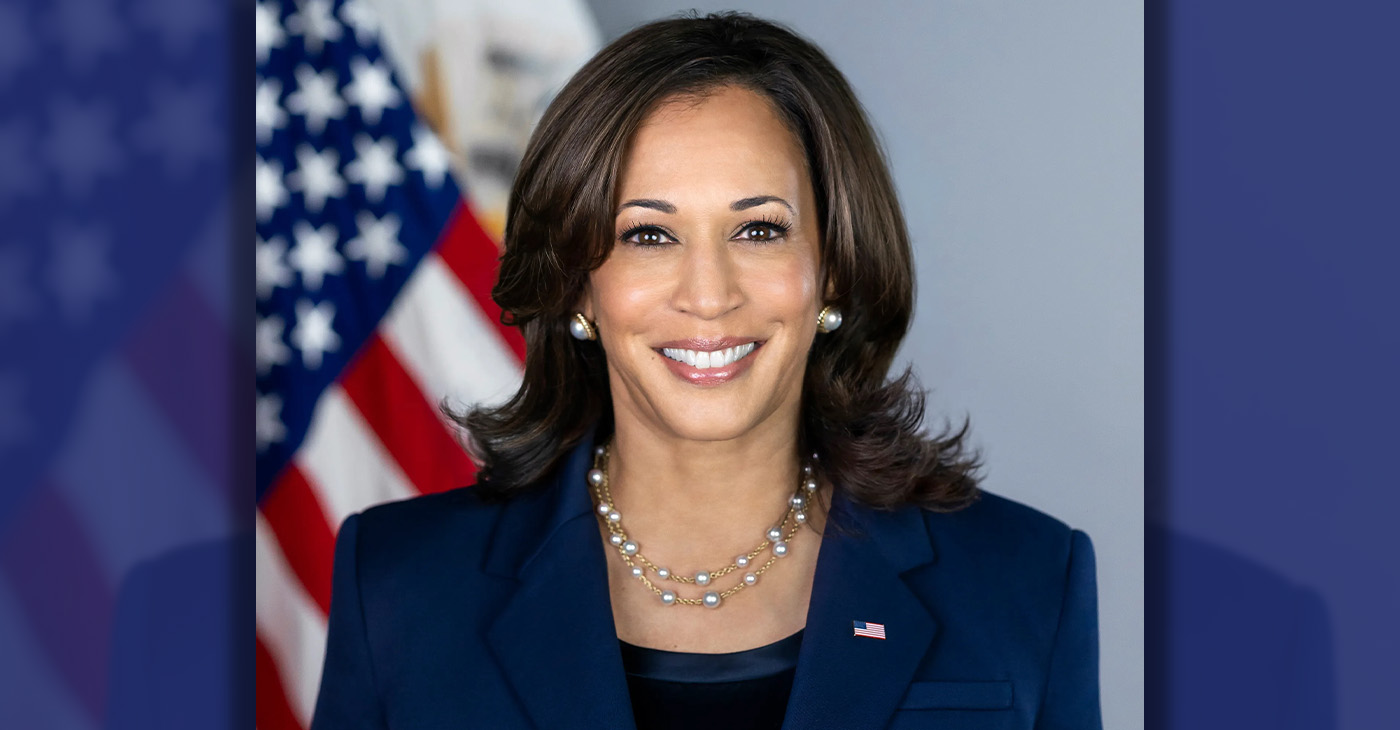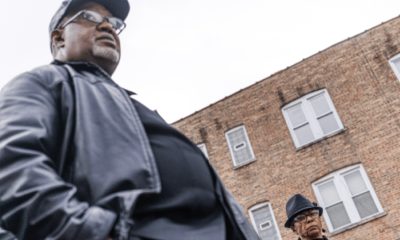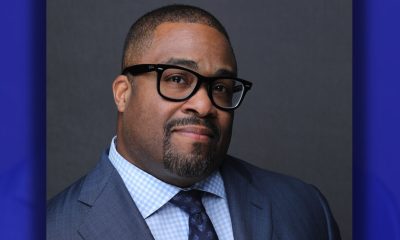Business
Black pharmacists going ‘above and beyond’
FLORIDA COURIER — After a health insurance change forced Bernard Macon to cut ties with his Black doctor, he struggled to find another African American physician online. Then he realized two health advocates were hiding in plain sight. At a nearby drugstore in the suburbs outside of St. Louis, a pair of pharmacists became the unexpected allies of Macon and his wife, Brandy. Much like the Macons, the pharmacists were energetic young parents who were married — and unapologetically Black.
By Cara Anthony
SHILOH, Ill. — After a health insurance change forced Bernard Macon to cut ties with his Black doctor, he struggled to find another African American physician online. Then he realized two health advocates were hiding in plain sight.
At a nearby drugstore in the suburbs outside of St. Louis, a pair of pharmacists became the unexpected allies of Macon and his wife, Brandy. Much like the Macons, the pharmacists were energetic young parents who were married — and unapologetically Black.
Vincent and Lekeisha Williams, owners of LV Health and Wellness Pharmacy, didn’t hesitate to help when Brandy had a hard time getting the medicine she needed before and after sinus surgery last year.
The Williamses made calls when Brandy, a physician assistant who has worked in the medical field for 15 years, didn’t feel heard by her doctor’s office.
“They completely went above and beyond,” said Bernard Macon, 36, a computer programmer and father of two. “They turned what could have been a bad experience into a good experience.”
Black doctors, dentist
Now more than ever, the Macons are betting on Black medical professionals to give their family better care. The Macon children see a Black pediatrician. A Black dentist takes care of their teeth. Brandy Macon relies on a Black gynecologist.
And now the two Black pharmacists fill the gap for Bernard Macon while he searches for a primary care doctor in his network, giving him trusted confidants that chain pharmacies likely wouldn’t.
Trust, understanding
Black Americans continue to face persistent health care disparities.
Compared with their White counterparts, Black men and women are more likely to die of heart disease, stroke, cancer, asthma, influenza, pneumonia, diabetes and AIDS, according to the Office of Minority Health.
But medical providers who give patients culturally competent care — the act of acknowledging a patient’s heritage, beliefs and values during treatment — often see improved patient outcomes, according to multiple studies.
Part of it is trust and understanding, and part of it can be more nuanced knowledge of the medical conditions that may be more prevalent in those populations.
Creative support
For patients, finding a way to identify with their pharmacist can pay off big time.
Cutting pills in half, skipping doses or not taking medication altogether can be damaging to one’s health — even deadly. And many patients see their pharmacists monthly, far more often than annual visits to their medical doctors, creating more opportunities for supportive care.
That’s why some Black pharmacists are finding ways to connect with customers in and outside of their stores.
Inspirational music, counseling, accessibility and transparency have turned some minority-owned pharmacies into hubs for culturally competent care.
“We understand the community because we are a part of the community,” Lekeisha Williams said. “We are visible in our area doing outreach, attending events and promoting health and wellness.”
History of mistrust
To be sure, such care is not just relevant to African Americans. But mistrust of the medical profession is especially a hurdle to overcome when treating Black Americans.
Many are still shaken by the history of Henrietta Lacks, whose cells were used in research worldwide without her family’s knowledge; the Tuskegee Project, which failed to treat Black men with syphilis; and other projects that used African Americans unethically for research.
At Black-owned Premier Pharmacy and Wellness Center near Grier Heights, a historically Black neighborhood in Charlotte, N.C., the playlist is almost as important as the acute care clinic attached to the drugstore.
Owner Martez Prince watches his customers shimmy down the aisles as they make their way through the store listening to JayZ, Beyoncé, Kirk Franklin, Whitney Houston and other Black artists.
Prince said the music helps him in his goal of making health care more accessible and providing medical advice patients can trust.
More than dispense
In rural Georgia, Teresa Mitchell, a Black woman with 25 years of pharmacy experience, connects her customers with home health aides, shows them how to access insurance services online and even makes house calls.
Her Total Care Pharmacy is the only health care provider in Baconton, where roughly half the town’s 900 residents are Black.
“We do more than just dispense,” Mitchell said.
Iradean Bradley, 72, became a customer soon after Total Care Pharmacy opened in 2016. She struggled to pick up prescriptions before Mitchell came to town.
“It was so hectic because I didn’t have transportation of my own,” Bradley said. “It’s so convenient for us older people, who have to pay someone to go out of town and get our medicine.”
Educating patients
Lakesha M. Butler, president of the National Pharmaceutical Association, advocates for such culturally competent care through the professional organization representing minorities in the pharmacy industry and studies it in her academic work at the Edwardsville campus of Southern Illinois University.
She also feels its impact directly, she said, when she sees patients at clinics two days a week in St. Charles, Mo., and East St. Louis, Ill.
“It’s just amazing to me when I’m practicing in a clinic setting and an African American patient sees me,” Butler said. “It’s a pure joy that comes over their face, a sigh of relief. It’s like ‘OK, I’m glad that you’re here because I can be honest with you and I know you will be honest with me.’”
She often finds herself educating her Black patients about diabetes, high blood pressure, high cholesterol and other common conditions.
“Unfortunately, there’s still a lack of knowledge in those areas,” Butler said. “That’s why those conditions can be so prevalent.”
Bad experience
For Macon, his experiences with medical professionals of backgrounds different from his own left him repeatedly disappointed and hesitant to open up.
After his wife had a miscarriage, Macon said, the couple didn’t receive the compassion they longed for while grieving the loss. A few years later, a bad experience with their children’s pediatrician when their oldest child had a painful ear infection sparked a move to a different provider.
“My daughter needed attention right away, but we couldn’t get through to anybody,” Macon recalled. “That’s when my wife said, ‘We aren’t doing this anymore!’”
Today, Macon’s idea of good health care isn’t colorblind. If a doctor can’t provide empathetic and expert treatment, he’s ready to move, even if a replacement is hard to find.
HUED app
Kimberly Wilson, 31, will soon launch an app for consumers like Macon who are seeking culturally competent care. Therapists, doulas, dentists, specialists and even pharmacists of color will be invited to list their services on HUED.
Beta testing is expected to start this summer in New York City and Washington, D.C., and the app will be free for consumers.
“Black Americans are more conscious of their health from a lot of different perspectives,” Wilson said. “We’ve begun to put ourselves forward.”
But even after the introduction of HUED, such health care could be hard to find.
While about 13% of the U.S. population is Black, only about 6% of the country’s doctors and surgeons are Black, according to Data USA.
Black pharmacists make up about 7% of the professionals in their field, and, though the demand is high, Black students accounted for about 9% of all students enrolled in pharmacy school in 2018.
‘Barbershop feel’
For Macon, though, the Williamses’ LV Health and Wellness Pharmacy in Shiloh provides some of the support he has been seeking.
“I still remember the very first day I went there. It was almost like a barbershop feel,” Macon said, likening it to the community hubs where customers can chitchat about sports, family and faith while getting their hair cut.
“I could relate to who was behind the counter.”
This article originally appeared in the Florida Courier.
Activism
Oakland Post: Week of April 17 – 23, 2024
The printed Weekly Edition of the Oakland Post: Week of April 17 – 23, 2024

To enlarge your view of this issue, use the slider, magnifying glass icon or full page icon in the lower right corner of the browser window. ![]()
Business
V.P. Kamala Harris: Americans With Criminal Records Will Soon Be Eligible for SBA Loans
Speaking in Las Vegas on Jan. 27, Vice President Kamala Harris announced a forthcoming federal rule that will extend access to Small Business Administration (SBA) loans to Americans who have been convicted of felonies but have served their time. Small business owners typically apply for the SBA loans to start or sustain their businesses.

By California Black Media
Speaking in Las Vegas on Jan. 27, Vice President Kamala Harris announced a forthcoming federal rule that will extend access to Small Business Administration (SBA) loans to Americans who have been convicted of felonies but have served their time.
Small business owners typically apply for the SBA loans to start or sustain their businesses.
Harris thanked U.S. Rep. Steven Horsford (D-NV-04), the chair of the Congressional Black Caucus, for the work he has done in Washington to support small businesses and to invest in people.
“He and I spent some time this afternoon with business leaders and small business leaders here in Nevada. The work you have been doing to invest in community and to invest in the ambition and natural capacity of communities has been exceptional,” Harris said, speaking to a crowd of a few hundred people at the Brotherhood of Electrical Workers Hall in East Las Vegas.
On her daylong trip, Harris was joined by Horford, SBA Administrator Isabella Guzman, Interim Under Secretary of Commerce for Minority Business Development Agency (MBDA) Eric Morrissette, and Sen. Catherine Cortez Masto (D-Nev).
“Formerly incarcerated individuals face significant barriers to economic opportunity once they leave prison and return to the community, with an unemployment rate among the population of more than 27%,” the White House press release continued. “Today’s announcement builds on the Vice President’s work to increase access to capital. Research finds that entrepreneurship can reduce recidivism for unemployed formerly incarcerated individuals by as much as 30%.”
Business
G.O.P. Lawmakers: Repeal AB 5 and Resist Nationalization of “Disastrous” Contractor Law
Republican lawmakers gathered outside of the Employee Development Department in Sacramento on Jan. 23 to call for the repeal of AB5, the five-year old California law that reclassified gig workers and other independent contractors as W-2 employees under the state’s labor code.

By California Black Media
Republican lawmakers gathered outside of the Employee Development Department in Sacramento on Jan. 23 to call for the repeal of AB5, the five-year old California law that reclassified gig workers and other independent contractors as W-2 employees under the state’s labor code.
Organizers said they also held the rally to push back against current efforts in Washington to pass a similar federal law.
“We are here to talk about this very important issue – a battle we have fought for many years – to stop this disastrous AB 5 policy,” said Assembly Republican Leader James Gallagher (R-Yuba City).
Now, that threat has gone national as we have seen this new rule being pushed out of the Biden administration,” Gallagher continued.
On Jan. 10, the U.S. Department of Labor issued a new rule providing guidance on “on how to analyze who is an employee or independent contractor under the Fair Labor Standards Act (FLSA).”
“This final rule rescinds the Independent Contractor Status Under the Fair Labor Standards Act rule (2021 IC Rule), that was published on January 7, 2021, and replaces it with an analysis for determining employee or independent contractor status that is more consistent with the FLSA as interpreted by longstanding judicial precedent,” a Department of Labor statement reads.
U.S. Congressmember Kevin Kiley (R-CA-3), who is a former California Assemblymember, spoke at the rally.
“We are here today to warn against the nationalization of one of the worst laws that has ever been passed in California, which has devastated the livelihoods of folks in over 600 professions,” said Kiley, adding that the law has led to a 10.5% decline in self-employment in California.
Kiley blamed U.S Acting Secretary of Labor, July Su, who was the former secretary of the California Labor and Workforce Development Agency, for leading the effort to redefine “contract workers” at the federal level.
Kiley said two separate lawsuits have been filed against Su’s Rule – its constitutionality and the way it was enacted, respectively. He said he is also working on legislation in Congress that puts restrictions on the creation and implementation of executive branch decisions like Su’s.
Assemblymember Kate Sanchez (R-Rancho Santa Margarita) announced that she plans to introduce legislation to repeal AB 5 during the current legislative session.
“So many working moms like myself, who are also raising kids, managing households, were devastated by the effects of AB 5 because they lost access to hundreds of flexible professions,” Sanchez continued. “I’ve been told by many of these women that they have lost their livelihoods as bookkeepers, artists, family caregivers, designers, and hairstylists because of this destructive law.”
-

 Activism4 weeks ago
Activism4 weeks agoOakland Post: Week of March 20 – 26, 2024
-

 #NNPA BlackPress3 weeks ago
#NNPA BlackPress3 weeks agoCOMMENTARY: D.C. Crime Bill Fails to Address Root Causes of Violence and Incarceration
-

 #NNPA BlackPress4 weeks ago
#NNPA BlackPress4 weeks agoFrom Raids to Revelations: The Dark Turn in Sean ‘Diddy’ Combs’ Saga
-

 #NNPA BlackPress3 weeks ago
#NNPA BlackPress3 weeks agoMayor, City Council President React to May 31 Closing of Birmingham-Southern College
-

 #NNPA BlackPress4 weeks ago
#NNPA BlackPress4 weeks agoCOMMENTARY: Lady Day and The Lights!
-

 Activism3 weeks ago
Activism3 weeks agoOakland Post: Week of March 27 – April 2, 2024
-

 #NNPA BlackPress4 weeks ago
#NNPA BlackPress4 weeks agoBaltimore Key Bridge Catastrophe: A City’s Heartbreak and a Nation’s Alarm
-

 #NNPA BlackPress4 weeks ago
#NNPA BlackPress4 weeks agoBaltimore’s Key Bridge Struck by Ship, Collapses into Water




















































